| Understanding Vitamin A | Buyer’s Guide | Retinoids (Vitamin A) List | Carotenoids List | Supplement Interactions | Overall |
Yes, it might be a little early for a 2022 list. However, I feel I can pull it off. This article is about tackling and providing the most comprehensive insights and most up-to-date information on all that comes to both the best vitamin A supplements 2022 and the best Carotenoids supplements 2022.
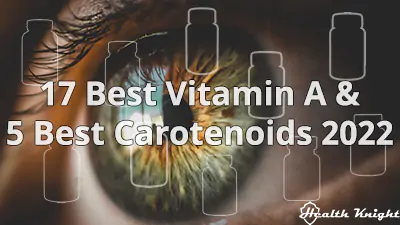 And it will also include vegan and vegetarian recommendations as well.
And it will also include vegan and vegetarian recommendations as well.
For all that, we will start out by truly learning and understanding vitamin A. That we will transition into a list of the ideal characteristics that both lists should strive towards.
We’ll also discuss why each of them is important. And then, it will be the time to get into the actual list of them, as well as providing some core insights about each.
So, whether we’re battling acne or a deficiency, whether we’re looking to heal our vision or just to make sure we have enough of everything for optimal health and well-being, this article is about helping you find what you seek. And about helping you do it as quickly as possible.
During the research process for this article, I went over every single preformed vitamin A supplement and Carotenoids supplement that I could possibly find (namely, supplements that primarily contained either of the ingredients). Also, I dived into many various bestseller lists.
All of that, to ultimately dissect well over 300 various supplements and to bring what I believe is the most comprehensive article on the subject.
Understanding Vitamin A & Its Many & Commonly Unknown Intricacies
Well, when it comes to vitamin A, there are a lot of confusing and even misleading information about it. I hope to make it more clear and understandable here.
First, there are two forms of vitamin A – Carotenoids and Retinoids. Both are very different, both can’t really be replaced by the other, both have their own unique benefits, and both are very, very needed. Furthermore, if anything, they complement each other in all of the positive effects [R, R, R, R, R, R, R, R, R, R, R].
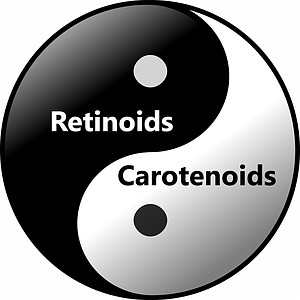 So, both of these should be found in a proper vitamin A supplement, right? There is, however, a very different trend on the market.
So, both of these should be found in a proper vitamin A supplement, right? There is, however, a very different trend on the market.
What I mean is, specialized vitamin A supplements barely ever contain Carotenoids, they are more focused on the actual Retinoids. Whereas for Carotenoids, we have it vice-versa. Where there is proper Carotenoid presence, preformed vitamin A is nowhere to be found.
But be that as it may, while many lists out there put the emphasis only on the preformed vitamin A (Retinols, Retinoids), I don’t think that’s enough.
It’s not enough to just explore a half of what at its very core vitamin A actually is (in its widest interpretation). Even more so because it’s not enough to just satisfy ourselves with either if what our biochemistry naturally seeks is both.
Hence, we will be looking at both. For each a separate list.
However, despite there being a separate list for each, the criteria for them barely differentiates. Meaning, the only real variations lie within the actual beneficial ingredients and their amounts. Other than that, both supplements have to use harmless additives, be of proper manufacturing practices, and must not be overpriced. Additionally, there’s also the aspect of potentially containing other additions that are not overbearing. However, that last one is extremely secondary.
The chapter to follow will explain each of these in detail.
The 5 Aspects That We Should Actually Be On A Lookout For
Aspect No. 1 | Active Ingredients Must Be Of High Value And Use The Most Effective Forms
Retinoids. Retinoids (also referred to as preformed vitamin A) are what people typically refer to when talking about vitamin A. It’s that form which upon consumption is immediately available to our bodies and does not need conversion to benefit us [R, R, R, R].
 There are many various forms of retinoids available – Retinol, Retinyl Palmitate, Retinyl Acetate, Retinyl Propionate, Retinaldehyde, Tretinoin, Adapalene, Isotretinoin, Tazarotene and there are others as well. All of these, however, are not used in supplements [R, R, R, R].
There are many various forms of retinoids available – Retinol, Retinyl Palmitate, Retinyl Acetate, Retinyl Propionate, Retinaldehyde, Tretinoin, Adapalene, Isotretinoin, Tazarotene and there are others as well. All of these, however, are not used in supplements [R, R, R, R].
Many are, in fact, used in skincare products. In this regard, the forms that are the most common among vitamin supplements are Retinol, Retinyl Palmitate, Retinol Palmitate, Retinyl Acetate, Vitamin A Palmitate, Retinol Acetate, Vitamin A Acetate and Vitamin A from Fish Liver Oil [R, R, R, R].
In reality, however, there are only essentially 4 options because Retinyl Palmitate is the same thing as Vitamin A Palmitate or Retinol Palmitate and Retinyl Acetate is the same thing as Vitamin A Acetate or Retinol Acetate. And then, of course, to finish off the total 4 there are the Retinol and Vitamin A from Fish Liver Oil [R, R, R, R, R].
So, which one is the most effective and which one should we choose?
Well, in truth, it doesn’t matter that much.
Although, on paper, Retinol is the most effective one, then comes Vitamin A Acetate, then lastly Vitamin A Palmitate (the natural form that’s also found in Fish Liver Oil), they are all well-absorbed. And any differences between their efficacy are offset by their conversion to International Units (abbreviated as IU on supplement labels) [R, R].
This means that, for example, 1000 IU of Vitamin A Acetate is roughly the same as 1000 IU of Vitamin A Palmitate in terms of the benefit to the body and brain.
From these, there is, however, a form that I assume would be the best to prefer. And that is Vitamin A Palmitate.
There are many sources that state that Vitamin A Palmitate is the synthetic form of preformed vitamin A. But nothing can be further from the truth as this form is the same form that can be found in various animal kingdom products, such as milk, cheese, egg yolks, and plenty others [R, R, R, R, R].
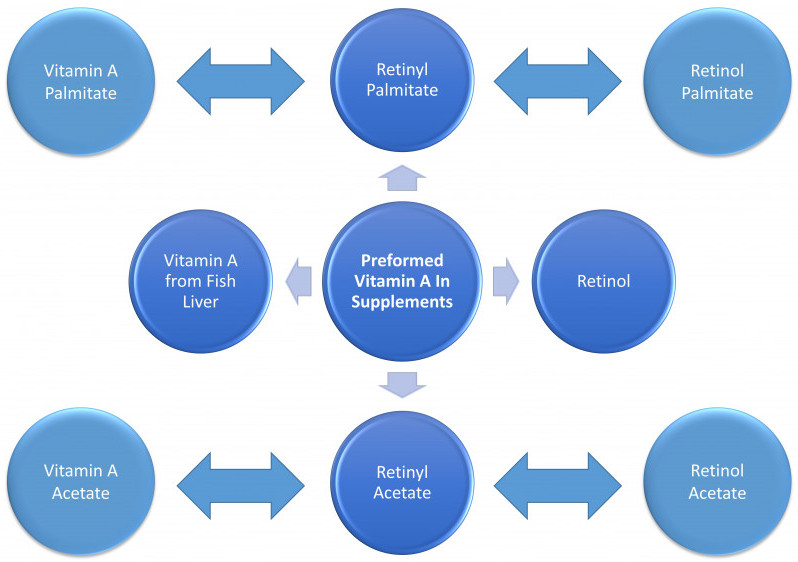 This form may be produced synthetically and this is probably also where this misconception originated from. But it’s crucial to understand that there is a huge difference between being produced synthetically and being the synthetic form of the vitamin [R, R, R, R].
This form may be produced synthetically and this is probably also where this misconception originated from. But it’s crucial to understand that there is a huge difference between being produced synthetically and being the synthetic form of the vitamin [R, R, R, R].
Truth told, all natural forms findable in supplements are made in a way synthetically, meaning they are made in a laboratory. One can’t naturally produce a supplement. There is no such thing as “natural production”. I mean, there’s no such thing as some miraculous tree or bush that grows capsules or tablets.
In fact, even when vitamins or minerals are derived from natural sources, it’s still done in a laboratory and may be regarded as synthetic production. In this sense, if we’re more comfortable with the vitamin being derived from a natural source, we can choose supplements that list Fish Liver Oil as their Vitamin A source.
Ultimately though, Vitamin A from Fish Liver Oil will be that same Vitamin A Palmitate (as noted earlier).
Carotenoids. When we’re talking about the best form of Carotenoids, we’re not talking about one singular substance that may come in many forms (compounds). This is because there isn’t one specific Carotenoid that comes in various shapes, but rather a group of many different ones.
There are upwards of at least 750 various different Carotenoids in existence. However, about 40-50 of those is what’s found in the typical human diet. The most common ones by names are Beta-Carotene, Alpha-Carotene, Beta-Cryptoxanthin, Zeaxanthin, Lutein, Lycopene, and also Astaxanthin [R, R, R, R, R, R, R].
Many people see them only as contributors to the overall preformed vitamin A amount we’re getting. But this approach is way too superficial as all of the Carotenoids, although in some ways similar, have different qualities and benefits [R, R, R, R, R, R, R, R].
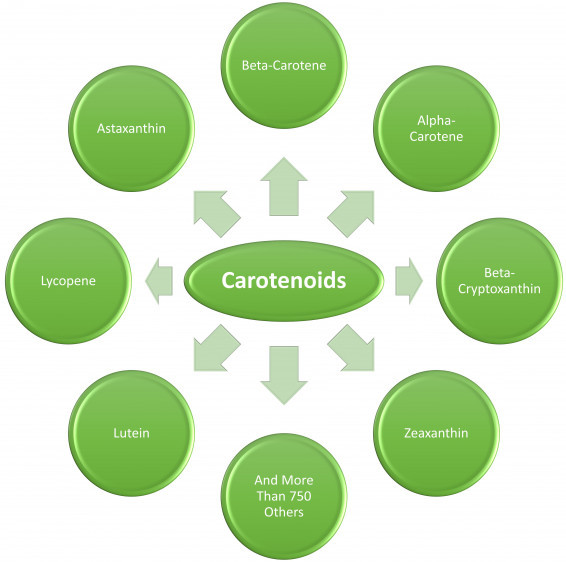 In fact, only about 10% of them our bodies are able to convert to preformed retinol (retinoids). The most common ones that are convertible are Alpha-Carotene, Beta-Carotene, and Beta-Cryptoxanthin (the conversion rates aren’t fantastic though) [R, R].
In fact, only about 10% of them our bodies are able to convert to preformed retinol (retinoids). The most common ones that are convertible are Alpha-Carotene, Beta-Carotene, and Beta-Cryptoxanthin (the conversion rates aren’t fantastic though) [R, R].
Nonetheless, all of them are important when it comes to our health and general wellness. Therefore, I do feel that when talking about Vitamin A, we can’t simply ignore Carotenoids like many do [R, R, R, R].
Oddly enough, as I mentioned earlier they’re barely ever, pretty much never a part of specialized vitamin A supplements. And here are some reasons why this could be.
First of all, it’s because preformed Vitamin A is essential to good health, so it’s really important to provide a straight-up-ready-to-use form of the vitamin to get the most out of it. Carotenoids are wrongfully regarded as solely complementary [R, R, R, R].
And second of all, it’s because some people can have quite some difficulties with converting Carotenoids into preformed vitamin A. But if the conversion is impossible or impaired, all the Carotenoids in the world won’t save us from vitamin A deficiency-related illnesses [R, R, R].
At the same time, Carotenoids can do stuff that preformed vitamin A can’t. So, again, both of them are extremely helpful. And better results will be more likely if they’ll have the opportunity to complement each other.
Aspect No. 2 | Preformed Vitamin A At 1000-2000 IU & Carotenoids At 15k-25k IU
While there are set Daily Values for vitamin A, they’re kind of misleading. To that end, there are only, so to say, two standards we’re truly concerned with when it comes to solid vitamin A, as well as Carotenoid supplements are the best practices for nutrient amounts (PDV) and the Upper Tolerable Intake Level (UL).
PDVs define the actual nutrient amounts that are needed to be consumed daily with supplements to achieve and retain a state of great health. ULs, on the other hand, are the absolute maximum amounts of nutrients that can be safely consumed daily long-term without any adverse effects [R, R, R, R, R].
So, PDV for vitamin A will be something to strive for when we’re primarily concerned with upholding great general health and well-being. And such will be an amazing addition to any conventional multivitamin that doesn’t inherently offer this form of active vitamin A, be it for men or for women.
Whereas nutrient amounts closer to ULs (completely fine long-term) and even beyond for monthly-ish (few months) use will be the choice when battling a deficiency, healing your skin, and attempting to better your eyesight or assist with other conditions.
The PDVs for preformed vitamin A are 1000-2000 IU. On average we’ll be getting slightly more of that in all of the proper multivitamin supplements. And that is not bad at all. Whereas the ULs, however, are set at 10,000 IU or 3000 micrograms.
When we’re talking about a typical standalone vitamin A supplement they’re averaging a dose close to the ULs or above that. To that end, a general well-being-focused dose is typically a rarety but they definitely do exist.
Whereas Carotenoids are quite a different animal altogether.
The best practices for nutrient amounts advise getting anywhere between 15,000 IU and 25,000 IU daily of Mixed Carotenoids. Which is essentially the equivalent of 9-15 milligrams.
However, it’s also fine if we find supplements that are even more generous with Carotenoids. Mainly because when it comes to ULs, they have not been set for them. It is presumed that the UL for Beta-Carotene might be around 20 milligrams a day. As for the rest – they’re not even considered. To that end, I’m not sure if they’re ever something we can have too much of [R, R, R, R, R].
No. 3, 4 & 5 | Additives, Manufacturing, And Reasonable Price All Play A Role With The Best
The added extra inactive ingredients or additives are something that very few consider when choosing a supplement. However, they profoundly affect the overall quality of any supplement. This is mainly because not all of them are harmless in their essence. And due to this, they can bring about some truly nasty side effects.
Which is never a mark of a great supplement.
Whereas manufacturing practices refer to how a particular supplement is made. How pure is it? How accurate it is with the stuff written on its label? All of this depends on that quality. Which if is not sufficient can even introduce incidental substances that can bring an unpredictable variety of side effects.
Which, again, is never a mark of a remarkable supplement.
Lastly, reasonable price matters quite a bit. Even the ingredient-wise most advanced supplement is not really worth it overall if it asks for an insane, unreasonable, excessively high sum. Hence, whatever the case, generally speaking, a supplement should always be a great-price-for-value type of thing.
17 Best Vitamin A Supplements in 2022 – Retinoids To Make A Difference
The first two of the entire list are what I refer to as the only supplements that matter. Which is because these are the two most important supplements on the whole list.
 So, No. 1 is what we should be getting if general health and well-being is our primary goal. In that regard, it will tie in well with any conventional multivitamin (for men or women) that doesn’t offer the crucial vitamin A form.
So, No. 1 is what we should be getting if general health and well-being is our primary goal. In that regard, it will tie in well with any conventional multivitamin (for men or women) that doesn’t offer the crucial vitamin A form.
Whereas No. 2 is the ideal supplement for vegans and vegetarians. Even more so because it also takes into consideration the aspect that almost all people in either of these groups won’t typically receive any preformed vitamin A from food that their body can immediately use to carry out crucial functions.
Thus, likely making it the only source for quality active vitamin A to their bodies as many people are known to not possess the gene that enables them to effectively turn Carotenoids into preformed vitamin A. Which essentially means that with a vegan or vegetarian diet you’re not getting any active vitamin A. Which inevitably will lead to massive deficiency [R, R].
No. 3 and No. 4 are the best options for trying to improve vision and battle acne. Whereas No. 5 is the top choice when it comes to making sure a deficiency, deficiency disease or other serious health condition takes a proper beating. However, I do reckon this may be also a very viable choice to potentially destroy acne. That said, use it with caution and at your own risk. It goes beyond ULs and can backfire if used for too long.
No. 1 | Solgar Cod Liver Oil (Vitamins A & D) – The Only Supplement That Matters
As mentioned earlier, Solgar Cod Liver Oil Vitamins A & D is the only supplement that matters if our main goal is great health and well-being in general.
It also fits what the best practices for nutrient amounts strive for, perfectly. And this just makes it the most viable supplement to couple with any conventional multivitamin that doesn’t offer any retinoids (preformed vitamin A).
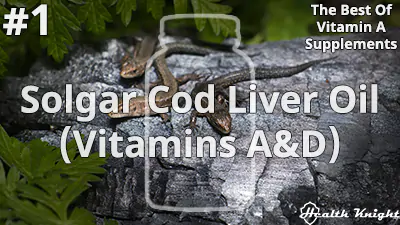 On top of that, it adds minute amounts of vitamin D as well. Which, quite honestly never hurts. Plus, it comes from Cod Liver Oil, and thus, the vitamin is present in its natural form. Which, by the way, is the exact same form that our skin produces when exposed to sunlight [R, R].
On top of that, it adds minute amounts of vitamin D as well. Which, quite honestly never hurts. Plus, it comes from Cod Liver Oil, and thus, the vitamin is present in its natural form. Which, by the way, is the exact same form that our skin produces when exposed to sunlight [R, R].
To put this into numbers, the supplement offers 1250 IU of Retinyl Palmitate and 135 IU (3.4 mg) of Cholecalciferol. The Solgar Cold Liver Oil is said to be Non-GMO, as well as Gluten-Free, Wheat-Free, Dairy-Free, Sugar-Free, Color-Free, Sweetener-Free, as well as a few others.
Whereas the additives are some of the safest out there (they’re essentially beneficial), and with that, there is not even the slightest concern for side effects [R, R, R, R, R, R, R, R, R, R, R].
On that note, it has to be said that Solgar is a pretty fine supplement manufacturer. They aspire to an ongoing mission of offering top-quality, innovative, science-based nutritional supplements. All in efforts to support their customer overall health and well-being. Plus, they are a global company with their own research facilities and many award-winning supplements.
Hence, this is the exact supplement I would buy if I ever felt I needed a bit more vitamin A or my multivitamin wouldn’t provide any.
No. 2 | Solgar Dry Vitamin A 1500 mcg – The Only That Matters For Vegetarians & Vegans
I believe the Solgar Dry Vitamin A 1500 mcg is the ideal preformed vitamin A supplement for all vegetarians and vegans out there. It’s for any one of those people that are into making sure that they’re at their best in terms of overall health and well-being.
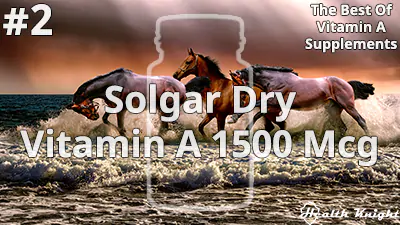 As the name suggests, the supplement offers 1500 micrograms or 5000 IU of Retinyl Palmitate (vegan suitable). Which is then complemented by some extra vitamin C in the form of L-Ascorbic Acid.
As the name suggests, the supplement offers 1500 micrograms or 5000 IU of Retinyl Palmitate (vegan suitable). Which is then complemented by some extra vitamin C in the form of L-Ascorbic Acid.
As of itself, the supplement will make up for the complete lack of preformed vitamin A that vegan diets typically struggle with. Similarly, also vegetarians will be in a good spot as this will make them far less dependent on the already scarce options in terms of food.
And the added little bit of extra vitamin C is never bad. It helps with the immune system’s function and a few other things [R, R].
Although the supplement introduces 5 different additives, all of its five should be regarded as harmless and completely okay to have [R, R, R, R, R, R, R, R, R, R, R].
This is the exact supplement I would buy if I’d ever turn to vegan or vegetarian diets.
No. 3 | Pure Encapsulations Vitamin A + Carotenoids – Solid Chance At Improving Vision
Pure Encapsulations Vitamin A + Carotenoids is a skillful blend of preformed vitamin A and the Carotenoids of Lutein, Zeaxanthin, and Astaxanthin. The first two of them are thought to be most impactful for healthy vision whereas the third is the most powerful one of them all.
 The supplement contains 1500 mcg or 5000 IU of Vitamin A Acetate, 3 mg of FloraGLO Lutein, and 500 mcg of each OPTISHARP Zeaxanthin and AstaReal Astaxanthin. So, it has three patented forms of Carotenoids which are likely to be more beneficially impactful than any non-patented counterparts. Plus, the additives are absolutely clean in this one.
The supplement contains 1500 mcg or 5000 IU of Vitamin A Acetate, 3 mg of FloraGLO Lutein, and 500 mcg of each OPTISHARP Zeaxanthin and AstaReal Astaxanthin. So, it has three patented forms of Carotenoids which are likely to be more beneficially impactful than any non-patented counterparts. Plus, the additives are absolutely clean in this one.
As far as manufacturing goes, Pure Encapsulations truly care for quality and they go after it hard. Ultimately, I feel they are one of the highest quality supplement manufacturers out there.
They collaborate with many third-party laboratories that independently test their raw materials and finished products for purity and potency. They collaborate with many universities for clinical research. On top of that, they are GMP all the way while also exceeding USP standards for supplement manufacturing.
Thus, not only is the Vitamin A plus Carotenoids about great ingredients individually, but also it’s insanely good in terms of manufacturing and quality it employs. It’s just the best thing if we want vitamin A and Carotenoids in a single supplement.
This is the exact supplement I would buy if I was all about limiting my total of different supplements (hence, this kind of 2-in-1 thing) and it was affordably shippable worldwide.
No. 4 | Now Foods Vitamin A 10,000 IU – Great For Battling Acne & Other Skin Problems
Now Foods Vitamin A (10,000 IU) is a pretty straightforward supplement. It offers preformed vitamin A from both Retinyl Palmitate and Cod Liver Oil. And as the name suggests, it provides that in the amounts of 10,000 IU or 3000 mcg per softgel.
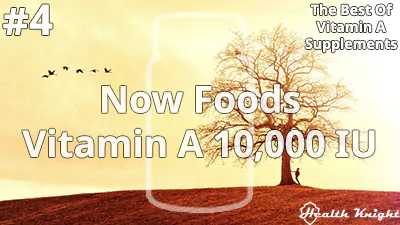 There are four things in particular that I really like about this supplement.
There are four things in particular that I really like about this supplement.
First, the supplement offers the maximum dose of daily preformed vitamin A that, according to Upper Tolerable Intake Levels, is known to be safe when used long-term.
Second, the supplement uses incredibly solid additives. There are 4 in total: bovine gelatin, glycerin, water, and organic extra virgin oil. Of these, water and glycerin are harmless but the bovine gelatin and organic extra virgin oil are not only harmless, but they’re also beneficial [R, R, R, R, R, R, R].
Third, the supplement is Non-GMO, Soy-Free, Corn-Free, Dairy-Free, Gluten-Free, Egg-Free, and Kosher. Plus, they partner with Underwriters Laboratories that assure the quality of all their products.
Fourth, it’s pretty busted in terms of price for value. I mean, it typically costs $3.92 per 100 capsules that will serve us a hundred days. Which means that it’s a daily investment of 3.9 cents. Which is very good given all that it is.
This is the exact supplement I would buy if I ever felt I needed a proper dose of vitamin A to battle acne or potentially other skin-related problems.
No. 5 | NOW Foods Vitamin A 25,000 IU – Best Choice If Battling Deficiency Or Disease
Here’s another Now Foods supplement which is basically the exact same supplement that the previous one is. The only significant difference is that it’s the more potent one.
 As the name suggests, NOW Foods Vitamin A 25,000 IU doesn’t exactly deal with the 10,000 IU. It goes way past that. Per softgel, it brings to the table the high dose of preformed vitamin A that 25,000 IU or 7500 mcg is.
As the name suggests, NOW Foods Vitamin A 25,000 IU doesn’t exactly deal with the 10,000 IU. It goes way past that. Per softgel, it brings to the table the high dose of preformed vitamin A that 25,000 IU or 7500 mcg is.
This supplement is never intended to be used for more than a fixed period of time (a couple of months likely). And it is only intended to battle deficiency, deficiency symptoms, or serious disease. Additionally, if 10,000 IU doesn’t make the acne go away, this is a potential alternative among a plethora of other possible solutions.
Similar to the previous one, this one also is Non-GMO, Soy-Free, Gluten-Free, Dairy-Free, Corn-Free, Egg-Free, and Kosher. Plus, those same amazing additives and that same remarkably affordable price (4.0 cents per softgel).
This is the exact supplement I would buy if I ever came to be vitamin A deficient or encountered other problems that could be healed by the vitamin.
No. 6 | Natural Factors Vitamin A
No. 7 | Country Life Dry Vitamin A
No. 8 | NOW Foods Ultra A & D3
No. 9 | Pure Encapsulations Vitamin A
No. 10 | NutraBlast Vitamin A & D3
No. 11 | Solaray Dry Vitamin A
No. 12 | Celebrate Vitamin A
No. 13 | Puritan’s Pride Vitamin A & D
No. 14 | Source Naturals Active A
No. 15 | Oceanic Nutra Vitamin A
No. 16 | Bariatric Advantage Dry Vitamin A
No. 17 | Carlson Labs Vitamin A (10,000 IU)
5 Best Carotenoids Supplements 2022 – Carotenoids For Vision & Brain

Carotenoid supplements are commonly quite full of various additives.
So much so that it’s hard to find a supplement that offers all of the Carotenoids, as well as uses 100% of completely harmless additives.
The supplements on this list are, however, the best ones I was able to find across the whole internet.
I mean, I would have loved to add to this list many more really exciting ones. But additives were, indeed, a problem for many. And so, I felt that I kind of had to leave those ones out. Which is a shame but not much we can do.
No. 1 | Live Conscious OptiWell – The Absolute Best Thing When It Comes To Carotenoids
As far as Carotenoid supplements go, I believe the Live Conscious OptiWell is just the best thing. It’s got plenty of high-value Carotenoids. It’s got great additives. And best of all, it’s also third-party tested for purity, potency, and safety. Furthermore, it even goes beyond all this.
 I mean, it doesn’t just provide Carotenoids. It uses a patented Carotenoid formulation known and scientifically proven to improve vision and brain health called OptiLut. It is capable of reducing eye fatigue and provides screen time support. Moreover, there are plenty of other benefits that the Carotenoids in this one can bring [R, R].
I mean, it doesn’t just provide Carotenoids. It uses a patented Carotenoid formulation known and scientifically proven to improve vision and brain health called OptiLut. It is capable of reducing eye fatigue and provides screen time support. Moreover, there are plenty of other benefits that the Carotenoids in this one can bring [R, R].
I mean, with this one, we get 4 milligrams of the most powerful Carotenoid Astaxanthin. Usually supplements provide 8-10 times less than that. So, it’s an absolute wealth for skin, heart, joint, and immune health along with fertility and energy improvements and anti-cancer, antioxidant, and anti-inflammation capability [R, R, R, R, R].
Also, were you aware that Carotenoids like Lutein and Zeaxanthin can actually boost our visual processing speed by up to 20% [R]?
I mean, these two have literally been proven to improve reaction speed. And let me just say that reaction speed can make such a tremendous difference in so many different situations. Be it avoiding collisions with reckless or drunk drivers, repelling a punch on the street, avoiding accidents of any kind, and even improving your gaming.
I also absolutely love the fact that it uses just harmless additives. Which is only further augmented by the fact that it’s Non-GMO, Gluten-Free, Soy-Free, Dairy-Free, and the fact that it’s third-party tested.
It’s pretty busted for what it offers which is why it’s my go-to option for Carotenoids.
No. 2 | Jarrow Formulas CarotenALL – The Most Viably-Abundant Option Out There
Jarrow Formulas CarotenALL is currently the most abundant supplement in terms of both Carotenoid variety and Carotenoid amounts out there. I mean, I wasn’t able to find anything that would even remotely come close to this one.
 The supplement provides a prosperity of Alpha-Carotene, Beta-Carotene, Lutein, Zeaxanthin, Lycopene, and Astaxanthin (in amounts about equivalent to 5-6 fruits or vegetables). Additionally, it also offers Gamma Tocopherol, which is a substance of vitamin E family [R, R, R].
The supplement provides a prosperity of Alpha-Carotene, Beta-Carotene, Lutein, Zeaxanthin, Lycopene, and Astaxanthin (in amounts about equivalent to 5-6 fruits or vegetables). Additionally, it also offers Gamma Tocopherol, which is a substance of vitamin E family [R, R, R].
So, with this one, we’re potentially looking at every single health benefit associated with these Carotenoids.
Everything from protecting to healing to maintaining to improving vision health, as well as promoting skin, immune, heart, and sexual well-being, battling diabetes, obesity, and cancer, fighting free radicals, protecting DNA, and just, in general, very anti-inflammatory in their nature [R, R, R, R, R, R, R, R, R, R, R, R, R, R, R, R, R, R].
Be that as it may, the particular supplement is sadly not 100% ideal; there’s a somewhat small hiccup. Meaning, of all the additives that it uses, there is one that I’m not particularly fond of. Organic Caramel.
It seems that it’s a natural flavor that’s created from at least some organic ingredients. Still, this is not automatically a good thing. Especially because the harmlessness of natural flavors is known to be highly dependent on the manufacturing quality. While it can even be beneficial, it’s not guaranteed to be that way; and more often is not that way [R, R, R, R].
So, how well does Jarrow Formulas stand?
As far as I can tell, the quality of their manufacturing seems to likely be solid also now. In the past, I’ve seen them sharing information about third-party testing. However, as of now, I couldn’t find any such reference on their website. Thus, overall, I believe it likely should be fine. Still, I’d much prefer if they were more transparent. But be that as it may, it’s still an incredible supplement [R].
This is the exact one I would go for if the Live Conscious OptiWell did not exist.
No. 3 | Natural Factors BetaCareAll – Third-Party-Tested & Decent Composition
While I wouldn’t say that the active (beneficial) ingredients of Natural Factors BetaCareAll are superior to those you’ll find in No. 3 of this best Carotenoids list, this one has definitely the better additives. Whereas the clear deciding factor in favor of this one is the third-party testing for the quality they do (by ISURA) [R].
 So, not only do they organically grow all the raw materials for their supplements themselves, but also they take true care for the quality of the end-products to ensure maximum purity, safety, and potency (and that to prove that they’re not GMO). Which can’t really be said about many supplement manufacturers out there [R, R].
So, not only do they organically grow all the raw materials for their supplements themselves, but also they take true care for the quality of the end-products to ensure maximum purity, safety, and potency (and that to prove that they’re not GMO). Which can’t really be said about many supplement manufacturers out there [R, R].
Or in other words, if many manufacturers kind of care, Natural Factors genuinely does.
The supplement itself offers 25,000 IU or 15 mg of Beta-Carotene, 495 mcg of Alpha-Carotene, 8.5 mcg of Gamma-Carotene, 2.5 mg of Lycopene, 2 mg of Lutein and 120 mcg of Zeaxanthin. Meaning, you get six different ones with a profound emphasis on Beta-Carotene. Which is not perfect (as I would prefer more of non-Beta-Carotene Carotenoids). But it is still very solid.
As for additives, while there are many, none of them will compromise your health. They’re all, to the very least, harmless; others are beneficial. So, it kind of goes without saying, the supplement overall is a great one. [R, R, R, R, R, R, R, R, R, R, R, R, R, R, R].
To that end, I feel obligated to warn against various ravings across the internet that BetaCareAll is a harmful supplement due to how much vitamin A it contains.
For starters, it doesn’t contain any vitamin A as of preformed vitamin A. It contains only Beta-Carotene and that’s a massive difference when it comes to upper tolerable intake levels (again, research-based standards for how much is okay to use long-term). For preformed vitamin A, that’s 10,000 IU, whereas, for Beta-Carotene, it’s said to not be enough research to clearly identify that [R, R, R].
Still, for the latter, it’s likely to be somewhere around 20 mg. But converting 25,000 IU of Beta-Carotene from International Units to milligrams is 15 mg. Which is absolutely safe to do. Even long-term (see more on this in the section on ideal Retinoids and Carotenoids amount).
Thus, this is the exact supplement that I would get if the Jarrow Formulas CarotenAll wouldn’t exist.
No. 4 | Shaklee CarotoMax – A Powerful Attempt At Being Almost Ideal
Shaklee CarotoMax is a very powerful Carotenoids supplement that with recent updates has become a very capable rival to No. 1 and No. 2 of this list. As it’s competitors, it offers six different Carotenoids in plentiful amounts. And has updated the quality of its ingredients.
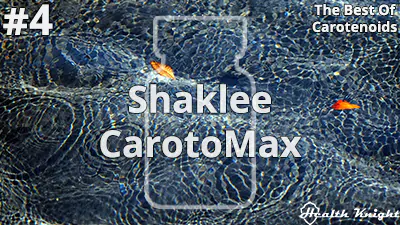 To that end, it offers 1500 mcg of Beta-Carotene, 5 milligrams of Lycopene, 5 mg of Lutein, 200 mcg of Zeaxanthin, 1.5 mg of Alpha-Carotene, and lastly 400 mcg of Astaxanthin. This for the combined amount of 13.6 mg of Carotenoids. Which is truly great.
To that end, it offers 1500 mcg of Beta-Carotene, 5 milligrams of Lycopene, 5 mg of Lutein, 200 mcg of Zeaxanthin, 1.5 mg of Alpha-Carotene, and lastly 400 mcg of Astaxanthin. This for the combined amount of 13.6 mg of Carotenoids. Which is truly great.
However, when it came to additives, it used to not be that great. Namely, Soybean Oil was one of its main additives that didn’t quite have Non-GMO associated with it. Which in that case, is a truly hazardous and inflammation-promoting substance. While it can still be harmful even when Non-GMO, I feel it should be far less of a trouble (although I’m not completely sure about that) [R, R, R, R, R, R, R, R, R].
And Shaklee is stepping into making sure all of their ingredients are Non-GMO. Thus, they’re essentially removing most if not all hazardousness of the inactive ingredient [R].
That said, another danger might be the Annatto Color that can be found among the additives (likely present to add a certain color to the softgels). Typically it should be fine, however, problems for some people that are sensitive to it may arise. And those can potentially be devastating ones [R, R, R, R, R].
Generally speaking though, as far as I can tell, Shaklee is a supplement brand that truly cares about their quality: everything from decent contaminant screenings to comprehensive quality tests to constantly seeking proof in science. But more importantly (in this case), they also offer a proper money-back guarantee within the frame of which you can get a full refund even if you send back an empty container [R].
So, although I do not see the supplement as a perfect one, I feel it’s very decent overall.
This is the exact one I would pick whenever I’d feel the need for extra Carotenoids and if both of the previous on this list wouldn’t exist.
No. 5 | California Gold Nutrition AstaCarotenoid Complex – Being Powerful With A Hiccup
The California Gold Nutrition AstaCarotenoid Complex in many ways is definitely one of the strongest options when it comes to Carotenoids on the market. It’s got plenty of things going for it. However, sadly enough, it isn’t all perfect. There are quite heavy potential drawbacks as well.
 What I really like about this supplement is that it offers plenty of different Carotenoids. I mean, there’s some Alpha, Beta, and Gamma-Carotene. But then, there’s also a ton of Lutein and Lycopene, as well as great amounts of Astaxanthin and Zeaxanthin. And it also adds Phycocyanin.
What I really like about this supplement is that it offers plenty of different Carotenoids. I mean, there’s some Alpha, Beta, and Gamma-Carotene. But then, there’s also a ton of Lutein and Lycopene, as well as great amounts of Astaxanthin and Zeaxanthin. And it also adds Phycocyanin.
It’s just really awesome to that end. But now, there are more positives but let’s cover some negatives before we do those.
And really, additives are the only negative. Personally, I really don’t like the Modified Food Starch, Carrageenan, and Sorbitol. These are just not the most optimal additives. That said, there’s one thing I genuinely like.
It’s the fact that they do third-party testing on this. And then, it’s also Non-GMO, Soy-Free, and it contains no Gluten. It’s just a really, really solid supplement apart from the additives.
And so, it probably wouldn’t work great as the number one of a list. But as a No. 5, I think it works rather well. I mean, although I’m not a fan of those other ingredients in here, I do see myself probably trying this if none of the previous supplements on this list would exist.
Vitamin A Supplement Interactions With Other Supplements To Know
In essence, any preformed vitamin A supplement can be used together with other supplements. And to gain the best results they should! Because the functions in our body are usually carried out by multiple vitamins at a time. The absolutely same goes for Carotenoid supplements.
When assessing, however, if any supplement discussed on this list is a good fit with other ones, you should evaluate them based on primarily how much preformed vitamin A they offer.
 For long-term use, ideally, the combined amounts of all supplements with preformed vitamin A should not go over the upper tolerable intake levels, commonly referred to as ULs (research-based, safe maximum daily dosages for long-term use).
For long-term use, ideally, the combined amounts of all supplements with preformed vitamin A should not go over the upper tolerable intake levels, commonly referred to as ULs (research-based, safe maximum daily dosages for long-term use).
Whereas for short-term use, there’s typically much more room to work with and that will highly depend from person to person. However, different people may react differently.
And I wouldn’t suggest adopting very high doses of the vitamin without a noteworthy medical reason for it as otherwise, that could turn out profoundly detrimental. And ultimately, it may bring more harm than good (best do it only under a controlled setting).
The long-term threshold (UL) for preformed vitamin A is, as you probably recall, set at 10,000 IU or 3000 micrograms. So, this is how much the combined amounts of all your supplements should not go over.
Whereas as far as Carotenoids go, they’re compatible with everything. Be sure to not go over 20 mg of combined amounts of Beta-Carotene from all supplements though. Otherwise, you generally should be good as long as you don’t go absolutely berserk with how many capsules of Carotenoids you consume (for example, don’t go with Jarrow Formulas CarotenALL triple recommended dose).
Or in other words, as long as you’re reasonable within that frame, it shouldn’t backfire and should be nothing but beneficial. Also for the long term.
To assist you, the examples below will illustrate how to do these calculations to be sure you’re under ULs. If I’ve not covered your specific case, you should be able to manage to figure it out by example. If, however, you don’t or you just want to make sure, it’s completely fine to let me know comments, and I’ll get back to you as soon as I can.
Example #1 – Proper Multivitamin Plus No. 4 Of Vitamin A Supplements
So, let’s say that you’re doing Thorne Research Advanced Nutrients as your multivitamin (one among the very best of the best multivitamins).
This supplement in regards to preformed vitamin A offers 750 micrograms of Vitamin A Palmitate which is the equivalent of 1363.5 IU.
So, here’s the question.
Would this supplement be okay to use daily long-term with the No. 4 supplement of the best vitamin A supplements list (NOW Foods Vitamin A)?
The short answer is no. But what’s the math here?
NOW Foods Vitamin A contains 10,000 IU of preformed vitamin A. This means that it’s already at the maximum amount you should ever use daily (for long term).
Thus, those additional 1363.5 IU that the multivitamin offers makes it so that the combined amounts would confidently go over the ULs established for vitamin A.
Hence, such a combination would be okay for short-term use but not so much for the long-term.
Example #2 – Vitamin A Supplement Plus Plant-Based Supplement
Now, let’s say, you’re taking a plant-based supplement that offers 10,000 IU of vitamin A. And you would like to combine it with the No. 2 of the best vitamin A supplement list (Solgar Dry Vitamin A).
Will it work?
The short answer is yes. Here’s why.
So, Solgar Dry Vitamin A provides 1500 mcg or 5000 IU of preformed vitamin A. Whereas plant-based supplements are, as the name suggests, based on plants. Meaning, preformed vitamin A is not a plant-based substance, Carotenoids are [R, R, R].
Thus, the very reason why the supplement label lists 10,000 IU of vitamin A is likely because of the fact that it actually is Beta-Carotene. Which may or may not be accompanied by other Carotenoids.
And so, 10,000 IU of Beta-Carotene and 5000 IU of preformed vitamin A does not equal 15,000 IU preformed vitamin A.
Rather those are two distinctly different substances that can’t be simply summed when assessing whether or not the combination will exceed ULs. It’s a nuance I’ve seen so many people confuse. So, keep that in mind.
Ultimately, combining the two is a safe thing for the long-term.
Example #3 – Proper Multivitamin Plus No. 2 of Carotenoids Supplements
Lastly, let’s say, you’d like to combine a proper multivitamin like the Klaire Labs Multithera 1 Capsule Formula Plus Vitamin K with the very best of Carotenoids supplement (Jarrow Formulas CarotenAll) for long-term use.
Would this be okay?
The short answer is yes. But what’s the math here?
Klaire Labs Multithera offers 750 mcg of Vitamin A Palmitate. Whereas CarotenALL doesn’t provide any preformed vitamin A. Hence, in terms of preformed vitamin A safety for long-term use, it’s great.
But what about Carotenoids?
CarotenALL quite clearly states that it contains 1200 mcg of Beta-Carotene. Whereas in the case of Multithera, within the 1500 mcg, it provides a mix of Beta-Carotene, Alpha-Carotene, and Beta-Cryptoxanthin.
This means that at worst, theoretically (but practically impossible) the combination of the two may provide as much as 2700 mcg or 2.7 mg of Beta-Carotene. Which is nowhere near the unofficial, potential ULs set amount of 20 mg.
Thus, such a combination is completely safe to do (both long-term and short-term).
Let This List & Knowledge Guide You But Careful Of Ill-Updated Lists
Although misconceptions on Vitamin A as a nutrient exists, I hope this article shattered them effectively.
I also hope that you’re now well-equipped to not only choose the most appropriate preformed vitamin A supplement or Carotenoids supplement, but also you feel confident in checking for their compatibility with your current regimen.
Moreover, I hope after reading this, none will be able to lure you into buying some mediocre, second-hand supplement. To that end, I also have to provide some words of caution. Namely, be careful of what you read on the other best-of lists online for both Carotenoids and preformed Vitamin A.
Many of them, although claim to be up-to-date, for some reason, they still contain supplements no longer manufactured. For example, on those lists, you can come across supplements like the Thorne Research Vitamin A. Which was something that was taken off the market not that long ago.
In my opinion, what this actually indicates is that many of the lists are just a regurgitation of the previous year’s content. Meaning, they’ve updated the title of the article or references to the year in it (from 2020 to 2021). But the article itself was never actually updated. So, be wary of these kinds of lists as they usually don’t have readers’ best interests in mind.
Above all, I hope this article on both the best vitamin A supplements 2022 and the best Carotenoids supplements 2022 helped you find the information you were looking for. Which supplements on the list in your opinion was the most badass? Which are the ones you’re dying to try? Let me know below.
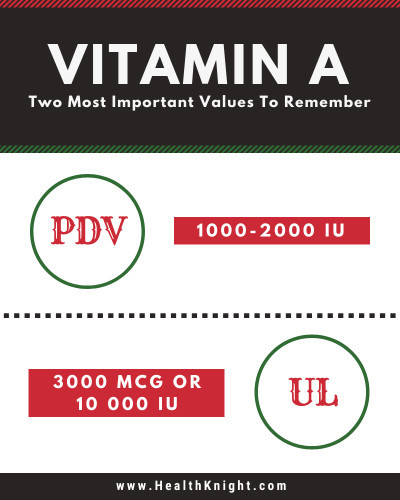
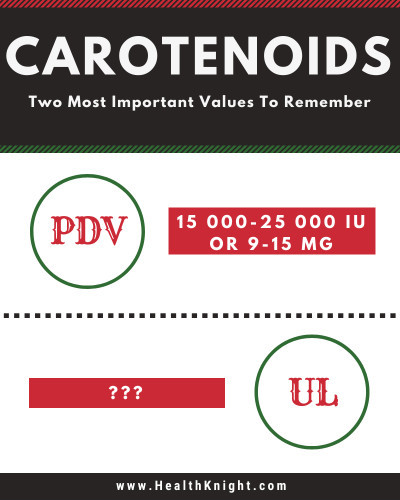
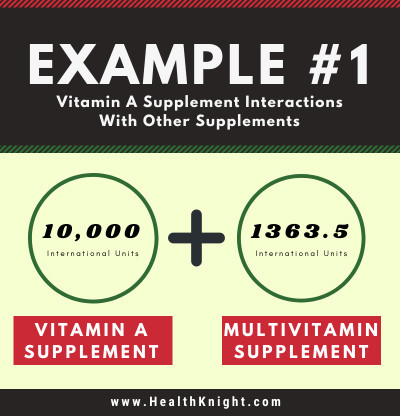
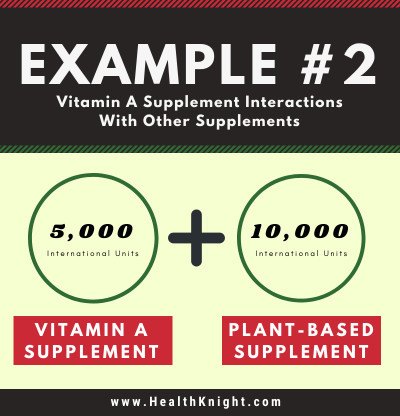
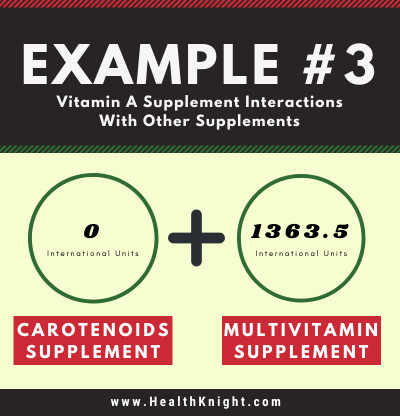
That was a really in-depth guide, it was very well researched. Vitamin A is indeed one of the very important supplements that we have to have enough of as it is necessary for vision, skin, tooth and bone health. I am currently taking multivitamins but I think after reading this article I will have to take a Vitamin A supplement too. I have been having adult acne and for a while I thought its the dairy in take that is causing it but I think I may be Vitamin A deficient too. Thank you for the great article! Very helpful.
Hey, Glowybabe!
I’m really glad you enjoyed the article. And I’m over the moon that you found it helpful. <3
I can only concur, vitamin A is definitely one of the essential nutrients. My hope is that you'll find great value in having that additional vitamin A in your daily regimen. :)
Cheers,
Matiss
To be honest I am a little overwhelmed by so much information, but I appreciate all the effort that you put for creating this post about the best vitamin A supplements. I didn’t know that Carotenoids and Retinoids were two different things and that each of them has various derivations.
What would happen if I had a deficit of vitamin A?
Hey, Fredery!
Thank you for all the appreciation, and I definitely emphasize to the fact that it can be overwhelming as it contains so much information. :)
Well, essentially all the things that I described as the conditions that can be addressed by proper vitamin A supplementation would happen. Among many others poor eyesight, immune system, skin, hair, and bone health – all can be the direct effect of vitamin A deficiency. But as I implied, there is a lot of other vitamin A deficiency-related indications as well.
Cheers, and stay healthy!
Matiss
Thank you for sharing with us this well-detailed article on the best vitamin A supplements. I enjoyed how honest and raw you were about not everyone needing to have a supplement of this kind. I can tell you that it’s sincerely appreciated.
Those two lists – one on the preformed vitamin A supplements and the other on the Carotenoid supplements are just BADASS.
I myself have recently run into some problems with my eyes, toward which the doctor told me to for starters look for foods rich in vitamin A to better the condition. But as it’s well known you can’t really acquire that much of vitamin A through food only (the doc also implied that). Will try going for one of the supplements from the preformed vitamin tree.
Thank you for all the insights. :)
Hey, Julienne!
I sincerely appreciate the kind words! I’m truly delighted that you enjoyed the article.
Definitely, have a try with the preformed retinol supplements. Do consider also a Carotenoid supplement, though. It will only be to a further benefit.
I hope you’ll get those problems under control.
If I can help you with anything, just let me know.
Cheers,
Matiss
Wow, what an extensive guide indeed! I thoroughly appreciate the research you must have done to gather and compile so much information. I had no idea how much I didn’t know about Vitamin A haha. Thanks for doing all this work to go in-depth so that I didn’t have to. Definitely have a better idea now of what I’m looking for! Cheers!
Hey, Byron!
I’m really glad you liked the article.
And thank you for appreciating the effort it took to make it happen. :)
Cheers,
Matiss
Honestly, I ultimately fell in love with this great website based on the fact that I have seen a lot of confused research, but this is very far from this to say the least. You seem to really know your stuff, the well drugged and extensive research especially on the preformed Vitamin A supplements definitely approves this.
I have a feeling that this article in particular can turn around all of the deep rooted misconceptions about the vitamin A out there. The website as a whole, however, is such a great resource for supplement advice. I strongly believe that it has a great future ahead of it and it has every opportunity to be an authority giant one day. :)
Keep it up! I wish you best of luck!
Hey, BigBux!
The words are too kind; I wholeheartedly appreciate them. They mean a lot. <3
I mean, I'm really happy you enjoyed the article, the research, and the effort it took. And thank you for the well-wishes.
And I really hope to get there one day. Will definitely do my best to make it happen. :)
Cheers,
Matiss
This is one of the best “very detailed” articles on the best vitamin A supplements I’ve read. To be very honest with you, I’m in a kind of information overload with the in-depth research you have come up with here. However, I have to congratulate you on this “Super Article”.
Nowadays, it is almost impossible to get all our supplements from a natural source. By reading your article I realized that my blurred vision (caused by type 2 diabetes) could be improved with preformed vitamin A and Carotenoids! Or am I wrong in my thinking here? What is your opinion on his one?
Hey, Denis!
Thank you for the kind words, I really appreciate it. I’m sorry about the information overload, that wasn’t my intention but I totally see how that’s possible. The goal was to provide a thorough article on vitamin A which I guess I’ve done well. :)
As for the Carotenoids and preformed vitamin A improving vision, yes, I believe that it’s possible.
I believe the most beautiful thing about our bodies and minds is that they have an incredible ability to heal themselves as long as we provide them with the right nutrients in the right forms and amounts.
While there definitely are other factors that do influence the health of our vision, preformed vitamin A and Carotenoids are, in my opinion, the best place to start.
Cheers, and Take Care!
Matiss
I had no idea retinol was a vitamin A! I thought it was some super complicated man-made chemical! I found it kind of refreshing that you said people don’t normally need to incorporate a singular vitamin A supplement into their daily routine. I believe so many times we pump too many extra supplements into a body that we don’t really need. For example, up here in the Midwest it is highly recommended that we take a vitamin D supplement (especially us women). I normally get my vitamin D levels tested about once a year at the doctor and my levels are fine without taking a supplement. No need to give my body that extra pill that it doesn’t need. Thanks for the great list of the best vitamin A supplements. There are so many out there it’s hard to choose without getting another opinion. Much appreciated!
I’m delighted you enjoyed the article, Lynne!
Glad to hear that your D levels are fine because most people’s aren’t.
I can only concur, with singular, not essential supplements like vitamin A, it definitely can be the case of pumping too many extra nutrients into our bodies. So, always be careful and mindful about that.
Whereas such important singular vitamin supplements such as singular vitamin D supplements can turn out to be crucial for achieving and maintaining one’s best health. Meaning they’re usually recommended even though one might be supposedly getting all the vitamin D that is needed from a proper multivitamin supplement.
Cheers,
Matiss
I really like the balanced advice you have about supplements here. I think it is really sound advice when you point out all the reasons why a supplement might not work for us where so much of it comes down to basic poor lifestyle choices, and yet so often we search for a miracle fix for things that would be fixed with better stress management and better diet and exercise habits. That being said, when all those things are already in place, and things are still not quite right, that’s when supplements can come in handy for sure-especially when our foods are being stripped of nutrients from our over farmed soils. It think in the future we will all have more access to tailored nutrition with the rise of technical advances. It will be interesting to see where the future of supplements go.
Hey, Liz!
Thank you for the kind words. I always try to provide as thorough and accurate information as possible, I appreciate you appreciating it. :)
I’m also very curious to see where the supplementation industry takes us. :)
Cheers and have a Great One!
Matiss
This a very thorough and in-depth. Thank you for taking the time to do this. I have heard of the brand for your number one, glad to see they rate so highly. One of my New Years resolutions is to take vitamins more regularly. Do you think a vitamin A supplement on its own is a good thing for all people? Or are there certain symptoms that I should use as a clue that I need a separate vitamin A supplement? Would a multi vitamin give enough A?
I’m glad this proved to be thorough, Holly. I really appreciate the kind words, they mean a lot. :)
Well, it depends on the multivitamin. Many of them these days don’t actually add any. I mean, yes, they claim to have some but it’s all Beta-Carotene. And Beta-Carotene is no Retinoid. Meaning, yes, our bodies can convert the former to the latter but the conversion rates are not great. Furthermore, it is estimated that about 50% of people don’t have the gene necessary to make that conversion.
Hence, the reality is that we’re typically not getting any vitamin A with a multivitamin. Yet it’s such a necessary vitamin.
To that end, I feel that if your multi only has Beta-Carotene, you should definitely get one.
Cheers,
Matiss
Fish and carrots are my natural ways to supplement vitamin A. In that sense cod liver oil works as well, but quite some time ago an essential part of my day to day life has become a vitamin A supplement. I had no idea that it’s generally not needed for maintaining of great health. I’ll definitely have a look into multivitamin supplements.
Thank you for all the insights, I really appreciate it!
Hey, Kit!
Yeah, I would agree with that on so many levels. Multivitamins are the primary way to go!
Other than that, I’m really glad that this proved to be helpful.
And if you eve need anything, just let me know!
Cheers,
Matiss
Hi again Matiss, this isn’t a criticism, but more if a question, but I have to ask it:
Lately it seems Live Concious has been consistely making the top spots for many types of supplements, which speak to the quality of manufacturer, but then again, I do question their third-parting testing.
How do you know that their claim of third-party testing is legit? As far as I could tell, when looking at each product, they make the claim of having done third part testing, but nowhere could I find the study or the third-party lab to corroborate what they are saying. It seems like it’s just a matter of, ‘We are claiming to have done third-party testing… Will you just please believe us?” with some of these companies, don’t you think? Or am I missing something about this third-party testing and the verification of their claims? I don’t know, just somewhat confused, perhaps you know of a resource to check the third-party testing results or conclusions, which I wasn’t able to find.
Again, just trying to ask a question and perhaps be constructive at the same time if what I had to say bares any truth or benefit.
Wow! this is really a very comprehensive and in-depth guide for vitamin A supplements. I heard that eating lever spread once a week can cover the need for vitamin A – not sure it’s true. But for those who don’t eat meat like myself, a vitamin supplement could be necessary.
And, indeed, vitamin A is very important in our health.
Thank you very much for this amazing article/guide. Looking forward to more of your valuable articles in the future.
Best regards,
Che
Hey, Che!
I’m happy you enjoyed it! It means the world to me. And thank you for the kind words. I’m really grateful for those.
As for that liver, yes, I’ve heard similar things. And if you enjoy liver, by all means. However, if you don’t or if you’re a vegan or vegetarian, a vitamin A supplement is probably a good idea. At least that’s how I see it.
Cheers,
Matiss
Hi Matiss,
What do you think of this cod liver oil? Thank you.
https://www.amazon.com/dp/B00FV53RQS
Hey, Oksana!
Sorry for not getting back to you sooner. I had to take some time off from the website. I hope you’re doing really well.
I like the fact that they are doing third-party testing. That’s awesome. In every other way, it looks decent as well. The way I see it, there’s definitely no harm in taking it.
Cheers, and have a Great One!
Matiss
I am so glad I found your website! Thank you for making a very confusing topic easy to understand. I learned so much reading your blog today. I’m buying the women’s vitamin code multi and #1 Vitamin A right now. I take Bausch & Lomb AREDS 2 for eyes . Sounds like I should switch to your #1 carotenoid. What do you think? Thanks so much!
Hey, Dawn!
First, let me just say that I’m sorry I haven’t managed to get back to you sooner. I had to take some time off from the website. I hope you’re doing really well. And I really appreciate the kind words.
I looked at the Bausch & Lomb AREDS 2, I didn’t like it.
Some potentially harmful additives (added ingredients used as a “glue” for the making of the thing) like Titanium Dioxide, Soybean Oil, FD&C Red 40, and FD&C Blue 1 (artificial colors).
Then, Zinc Oxide for Zinc is a very weak form. Dl-Alpha-Tocopheryl Acetate is the synthetic and potentially harmful option (especially if in abundance) for vitamin E. And caviar on top of all is the Cupric Oxide for Copper which as far as I’m aware studies have shown to be completely unabsorbable. Meaning, while it may be something listed on the label, it’s not something our bodies can physically digest for us to get benefit from. Or in other words, it’s a useless form; it will say 2 mg Copper but in reality, it will be more like 0 mg.
And so, yes. Personally, I’m absolutely certain that a proper multivitamin plus the #1 of Carotenoids can do an infinite times better job. I hope that helps.
Cheers,
Matiss
Hi Matiss,
Can I combine CarottenAll plus Solgar Cod Liver Oil with Garden of Life Vitamin Code Men for a long term use?
Thanks.
Best,
george
Hey, George!
Yes, the way I see it, absolutely.
It should work quite well together.
Cheers,
Matiss
In my mind, this is definitely a very informative article for anyone who’s after a vitamin A supplement or battling a deficiency and would like to truly know what are the best products to choose. I like how you have pointed out the different forms, reasons, and the benefits for anyone to know the difference. This will make it much easier to choose. The lists are very helpful and I believe the way you’ve done it is an amazing way to do it.
I have not tried vitamin A as a standalone. I always go for a multivitamin. But I can see where this would be good for optimal health, especially if a multivitamin doesn’t offer any vitamin A or is single-sided providing only retinoids or carotenoids. Just by going through this list, I believe anyone would be able to find one to try. Also, I love the fact that you haven’t left vegetarians and vegans out. So thoughtful.
My pick would be the Pure Encapsulations retinoids plus carotenoids supplement. I just really like the idea of having them both in a single one. Overall, I like this article a lot and if I should ever need to get a Vitamin A supplement, this would be the best place to be. Thank you.
Hey, Delores!
Thank you, thank you, thank you.
Thank you for your truly kind words. Thank you for sharing your thoughts. And thank you for letting me know.
I sincerely appreciate it. Like whole-heartedly appreciate it. It means to me more than you know.
And I’m very happy this has been very insightful. Also, I absolutely concur. I too really like the Pure Encapsulations Vitamin A + Carotenoids 90.
Cheers, and have a Wonderful Weekend!
Carpe minutam/Seize the moment,
Matiss
You have lots of very good, thorough information here. I’ve actually have been searching lately about ways to improve my vision. I feel like my vision is not as sharp as before. Maybe due to age as well. Vitamin A was one of the suggestions. I’m currently taking multivitamins but I think I would have to consult my doctor just to be safe before pumping up my vitamin A intake. Thanks a lot for sharing.
Hey, Sheilandc!
I’m glad to hear you enjoyed the article. And I appreciate the kind words.
And yeah, definitely feel free to do that. Always.
Cheers, and have a Great One!
Carpe minutam/Seize the moment,
Matiss
Dear Matiss,
Thanks for another helpful and informative post and I can tell you that, I have taken some great insights from this post.
This was very, very detailed and in-depth and took me a while to finish it but it’s really worth the read. I was unaware of the two forms that make up vitamin A; namely, Carotenoids and Retinoids. And I learned a whole lot else as well. The wide range of options you gave us is really helpful. And to be honest, one read is not enough. Thanks again.
Wishing you much Success!
Paul
Hey, Paul!
I’m very happy to hear this was insightful and helpful. And I can absolutely agree on the fact that one read may not be enough. I really tried to go all out to make the aspect of Carotenoid and Retinoid supplementation as easily navigable as possible.
Other than that, I hearty appreciate all the kind words. They mean a lot.
Cheers, and have a Wonderful Day!
Carpe minutam/Seize the moment,
Matiss
Hi Matiss
I’m completely blown by your extensive and in-depth review! I love how you’ve broken each section into easily digestible parts and the diagrams are incredibly helpful. It’s very impressive the amount of research and time you’ve spent and I’ve definitely bookmarked this page and your site. There is a ton of info to digest!
Of all the supplements you’ve mentioned, I’ve only heard of Solgar which I use for my iron intake. I’m really glad they’re mentioned twice on your list as a good company to use. I also take vitamin D3 as a liquid supplement which I understand goes well with vitamin A. Is this because it helps with the absorption rate? I think generally the Solgar Cod Liver Oil would work for me as it adds some more vitamin D3. Then I won’t have to take as much of the other vitamin D.
I’ll be looking out for the carotenoids to improve my vision in the future – and the fact that there are 750 types is astounding!
Thanks so much for the detailed and informative read.
In good health and peace be with you.
Teresa
Hey, Teresa!
Yeah, they definitely complement each other as most vitamins and minerals do. I’m not sure if either of them improves the absorption of the other though. At least, I’m not aware of it. But both are extremely important for good health.
Other than that, I sincerely appreciate the kind words. That bookmark means a lot. :)
Cheers, and have a Great One!
Carpe minutam/Seize the moment,
Matiss
Hello Matiss – Thank you for this most indepth and thourough guide to the best Vitamin A Supplements. What I loved about this page is that is didn’t just include a listing of the best vitamin A supplements, it provided very useful and important information around Vitamin A, its uses and benefits and also interactions with other types. This is greatly beneficial when searching for such a product like this.
I didn’t even know there were two forms of Vitamin A! This was definitely an educational post for me too. What is your opinion on seaweed products which claim to be a superfood containing all the nutrients your body needs on a daily basis (thus no need for taking a multi-vitamin)?
Looking forward to your reply and thanks so much again for this great info! Truly amazing. :)
Hey, LT Turner Jr!
I’m glad the article was really useful, insightful, educational for you. I’m very happy to hear that.
And I sincerely appreciate the kind words; they mean a lot.
As for that question on superfoods, I think generally they’re a great option for people that for some reason (whatever the reason) disowns consuming a multivitamin as those truly will help with the nutrients. However, from a purely objective standpoint, I don’t think that’s effectively possible.
Here’s what I mean.
While do they offer many different nutrients, I’ve not seen one superfood that offers every single one of them. Thus, you’re definitely still missing out on a few when compared to conventional multivitamins. However, given that I feel unconventional ones are the real thing based on all that I’ve researched in this space (which I’m well-aware may be biased), I’d say it’s impossible. You’ll never get the same amount of value out of them as you would from a proper multivitamin supplement.
Hence, I feel these seaweed products can further compliment the multivitamin but never replace it.
Cheers, and have a Great One!
Carpe minutam/Seize the moment,
Matiss